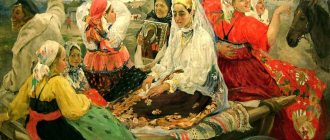In Dahl's dictionary
a maiden, a widow, or a divorcee arranged to marry; usually means a maiden; doomed or betrothed to her husband, wooed, betrothed, betrothed; drunk girl. The bride and groom, prince and princess, on their wedding day. The bride is honored everywhere. A bride without a place, a groom without a piece, about a poor wedding. A bride is not a wife: you can get divorced. | In general, every adult girl who is said to have gotten married has entered into all ages. After all, she’s our bride, she’s grown up, she’s mature. In Moscow there is no translation for brides! Griboyedov. To sort out too many brides, a married man can never live like that. The girl will be born when she is fit to be a bride (when she is ready to marry). Every bride is born for her groom. For whom the bride is suitable, for that she will be born. There are many rich brides everywhere - right up to the crown. The girl is getting married, and is the same age as her grandmother! If the bride drops her handkerchief under the aisle and the groom picks it up, she will soon die; belief. | Church sometimes vm. daughter-in-law, daughter-in-law. Christ or the Lord's Bride, St. our church; | holy martyrs; | virgin nuns; in general, girls who refused marriage for the sake of pilgrimage. To the north-east Russia, where the schism of priestlessness (Pomeranians, Spasovschina, etc.) is dominant, depravity in custom, because a sinless girl would become arrogant and begin to pray: Have mercy on me, sinless, and would be in hell; without sinning, you cannot beg; in the southwest, where the contemplative direction dominates in the schisms (Christianity, Khlysty, Molokans and Skoptsy), even in Orthodox villages many girls, covering their heads with a black scarf, refuse marriage and live chastely, willingly retiring to the cell in their parents’ yard, or in a row of cells, forming a kind of monastery near the village; These girls live by sewing and working, and their people call them brides of Christ; the same name, mockery, is given to seasoned virgins. Nevestin, which personally belongs to her; bride, to the bride, | relating to marriage in general. Nevestnik m. church. groom; | marital peace; | now: bride seeker, common groom. -nitsa matchmaker, a woman who searches for brides, and has all the brides and grooms to count. To marry a girl, to woo her. He is marrying Marya to himself, reading for himself. They have already disgraced her and wooed her. To marry, about a girl: to marry, to develop, to come in all years; | about an adult and unmarried person in general: to take on the appearance of a bride, to look young, to show off, to show off; or be modest, ashamed and hide, as befits a bride. I finally got married to the groom. The girl got married, matured and developed; became ignorant, became vulgar. I went to the landing to have some fun. Our Tatyana has become a bride. dressed up, cleaned up; got married to the bride, joined her or is with her. It has been unknown for a century. Daughter-in-law filial wife, daughter-in-law, daughter-in-law, -shenka; | brother's wife; | the wives of two brothers among themselves; | brother's husband's wife, yatrov, yatrovka; daughter-in-law: father-in-law, mother-in-law, brother-in-law, sister-in-law. The cat is beaten, and the daughter-in-law is told about the mother-in-law. I'm tired of tea, my daughter-in-law, come on, the ceilings! talk mother-in-law Even if the daughter-in-law was a fool, if only the fire would blow out earlier, that is, she would manage and work. The daughter-in-law sat down to spin: take care of your eyes, brothers-in-law! that is, she is not a spinner. This is for revenge on the daughter-in-law. Keep quiet, daughter-in-law: I’ll buy a sundress! talk father-in-law Our daughter-in-law doesn’t eat all the cod: she eats honey too! Three daughters-in-law - run away from the hut! Nevestkin, everything that is hers, that personally belongs to her.
The meaning and origin of the word bride in Old Church Slavonic
Now, without further ado, let’s look at the word “bride” again. Let's break it down into parts that carry a certain meaning. We will get no-ve-sta. Not - denial, ve - know, know, hundred - this is something fundamentally standing on earth. By analogy with the words table, chair, pillar. In my opinion, now everything is extremely obvious even without Sanskrit. The meaning of the word bride among the Slavs is a woman who does not know stability, a woman without support in life. Wherever the wind blows, there she goes.
The bride is the ignorant, the ignorant. Vest is an ancient Russian, old Slavic word v;st - “knowledge”. Avesta - Aryan knowledge. The bride is ignorance.
This version is confirmed by the meaning of another Russian word - “witch”. It was the Westerners who desecrated him. And in Rus' it denoted the universally respected family of women - the knowing mother. A woman who raised children and is wise with life experience.
In Rus', a clear-eyed bride crosses the threshold of her husband’s house, and over the years she turns into a grumpy witch. Isn’t that the case in our lives, guys, to this day? It seems that I have spilled the age-old secret of the origin of the word bride. Lest it now lose all its attractive power for suitors. Although, this is unlikely.
Ivan Ivanovich A.
Once upon a time there lived an old man and an old woman - why do they say that?
Colors of rainbow
In Vasmer Max's dictionary
bride daughter-in-law, Ukrainian bride, blr. bride, old glory bride νύμφη (Sup.), Bulgarian. nevyasta “bride, young woman”, Serbohorvian. njuesta “bride, daughter-in-law”, Slovenian. nevẹ́sta – the same, Czech. nevěsta – too, slvts. bridesta, Polish niewiasta “woman”, v.-luzh. ńewěsta. The best is still old. etymology, which sees the original here. meaning “unknown” (see not and know), cf. v.-luzh. wěstу “known, definite”, ńewěsty “unknown” (Stieber, ZfslPh 9, 382), Old Slav. known βέβαιος; see Mi. EW 214; Yagich, AfslPh 24, 227; Bernecker, AfslPh 38, 269; Brandt, RFV 23, 90; Zubaty, AfslPh 16, 404 et seq.; Vasmer, ZfslPh 20, 454; Schrader-Nehring 2, 374 et seq.; Convert I, 599. Cf. alb. rē “daughter-in-law”, lit. "new". The taboo name was supposed to protect a woman entering a house that was foreign to her, the house of her fiancé, from evil spirits; This also explains the presence of a wedding veil; see Brückner, Slavia, 5, 421 et seq.; Sɫown. 362. Wed. also Russian. dial stranger, alien “groom”, arkhang. (lower), v.-puddle. přikhodna dźowka "daughter-in-law". All other etymologies are doubtful; from the connection ne and vedǫ; Wed lit. nevẽdęs “unmarried” (I. IIImidt, Verw. 49); no more successful is the construction to *nevověsta. From new and lead (Old Russian vedu, lead “to marry”), contrary to Prusik (KZ 33, 160 et seq.), because ě remains unexplained (cf. Bernecker, IF 10, 166; Zubaty, AfslPh 16, 404 et seq.). Prusik's desire to interpret *věsta as a parable is unconvincing. past suffering from *vedǫ, since such forms are not attested. The work from I.-E. is just as unconvincing. excellent step (cf. Old Indian náviṣṭhas “the youngest”), i.e. the original. *nevьsta, later brought closer to věděti, contrary to Trubetskoy (“Slavia”, 1, 12 et seq.; see Korzhinek, LF 57, 9 et seq.); incredible and *nevě(i)sta in Vaian (RES 11, 9). The explanation from *nevě- “new-” and *sthā-, i.e. “in a new state” (Ilyinsky, AfslPh 24, 227 et seq.; 28, 456; Sat. Vs. Sreznevsky 31) is doubtful, as well as from *nevěvьsta from Czech. vdáti se “to get married”, cf. other-ind. víndatē, vindáti “reaches”, vittás, contrary to Mahek (ZfslPh 18, 315 et seq.), from *nev-ēdtā, supposedly pr. past suffering from *ēdō “I take for myself”, cf. other-ind. ādas “accepting”, āt-tas “accepted”, contrary to Korzynek (ibid.; ZfslPh 13, 416). The comparison with lit. nuo- and vaĩzdas “engagement” or with not and lit. vaisà “fertility”, pavaĩsti “to conceive”, i.e. “not conceived”, contrary to Bernecker (IF 10, 166); against see Mladenov 347. Finally, the assumption of kinship with Lat. noversa “stepmother” with the original *nevēsōr (Otrembsky, RF 11, 287), against see Walde-Hofm. 2, 180; Loyman, "Glotta", 20, 282 et seq. From here they caress. nevenya "bride", Pskov, Tver. (Dahl), by analogy with his own. Manya, Tanya; see Donya. •• (See also Trubachev, Term. Kinship, pp. 90 et seq.; Martynov, VYa, 1960, No. 5, p. 143; Otkupshchikov, “Etymol. research in Russian language.”, IV, M ., 1963, p. 96 et seq. - T.)
Who is a witch
In fact, in Rus', witches were not always evil and looked like scary old women. The term itself also comes from the word “to know.” Initially, women who practiced witchcraft and healing were called witches. Only a few centuries later the term acquired an “evil” connotation, and they began to call it women who caused harm and cast spells.
The potential for a malicious attack is very high: a vulnerability has been found in Windows antivirus
“My heart was breaking with pain.” Alisa Mon told the truth about her marriage to Muravyov
Long-term weather forecast for March 2021 by region (works on site)
To confirm this, we can recall a purely Slavic character - Baba Yaga. Despite all her attempts to appear evil, she is a real medicine woman and even a little sweet woman. He knows how to communicate with birds and animals, and even has a fiancé, Leshy.
In the dictionary D.N. Ushakova
BRIDE, brides, wives. a girl or woman getting married. “I’ll get you a bride.” A. Ostrovsky. | a girl who has reached marriageable age (colloquial). His daughters are already fiancées. “The bride-girl was smart about the groom.” Krylov. • Bride of Christ (obsolete) - 1 ) nun; 2 ) the girl is no longer young, not married (jokingly ironic). “Auntie... walked around the farm as Christ’s bride.” Saltykov-Shchedrin.
Is it true that “bride” and “witch” are the same root words?
Bride
If you objectively read this material and read in detail the book “Encyclopedia of Russian Customs”, then of course you will not be able to accept Vasmer’s statement that the Bride, they say, is “UNKNOWN, coming from nowhere.”
After all, the matchmaker finds out everything about the bride and tells the groom’s relatives about it and vice versa! And various rituals concerning the bride specifically take place: Farewell to the scythe, Prayer, Conspiracy, Hand-waving, Bachelorette party, Betrothal... What kind of bride is “from God knows where”? Out of nowhere, there can only be a humiliated Polonyanka, singled out {פלה/pla - “allocated for life”}, “used” and turned into a slave-“portomoy”. Even “Bride Kidnapping” is a rite of passage! No, no and NO!
Judging by the article from the Vasmer Etymological Dictionary, the Bride is a dirty port-washer that came from nowhere, which is used for its intended purpose by dirty drunken men and soldiers.”
The image of the “Bride” according to Vasmer somehow does not fit with the example of the purity and innocence of a young woman who should become a person’s second half, without whom he cannot (according to the concepts of the Torah, i.e. the ancient Hebrews and Slavs) be considered a full-fledged person.
A study of Russian customs shows that the Bride is by no means a girl from “God knows where.” After all, before walking down the aisle, the relatives of the bride and groom studied each other for a long time, visited each other, observing various rituals. For more information, see
My special article about the Russian Wedding, as well as the book of the group of authors “Encyclopedia of Russian Customs”, published by the completely Orthodox publishing house “Veche” in the Russian capital, the holy city of Moscow in 2001 (available in RuNet: https://omsk.edu.ru/schools /sch099/istoki/clav_1.htm ).
For more information about the wedding, see https://kultreferat.popal.ru/gate.html?name=News&file=categories&catid=17&pagenum=2
נביא שתיה/Nevi shtia = “Prophet (priest) + drink.” At the wedding ceremony - either in church or under the chuppah - the priest gives the newlyweds a drink from one cup, and it is the Bride who drinks first.
Paradise
רעיה raya - “pasture, *closeness in the herd; [רעות /raut – “friendship” ——► “secular reception”] ** coitus according to the covenant of God “be fruitful and multiply”
רעיה / raya – “1. friend 2. spouse, wife"
נוה סתה (סטה) / neve sta // neve sta = “dwelling, pasture, pasture; beautiful ++ holy to the Lord {phallus} (went astray, sinned)"
For the first time I vividly remembered the word “Vesta” from a speech by Mikhail Zadornov. He said that a bride is one to whom the news of marriage has not yet arrived. And when it came, it was called “Vesta”. The word resonated with me inside; before that I had not attached any meaning to it.
Then this word came across to me, but I remember clearly that before marriage I felt like a Bride. And now the word “Vesta” raises a storm of feelings from within and a whole range of female states. So I went online to find out what the difference is between these two female statuses and conditions?
And the Internet produced many versions, among the main ones were:
First: Vesta
- in Roman mythology, she is the goddess and patroness of the family hearth and sacrificial fire. In ancient times, a sacred fire was constantly burning in her honor, maintained by virgins - the Vestals. It was believed that any fire contains a particle of the spirit of Vesta.
Priestesses of Vesta - Vestals
– maintained a constant fire in the hearth of the temple of the goddess Vesta, symbolizing reliability, stability and order.
Vesta passed on her knowledge to the priestesses (Vestal Virgins) free of charge, bringing the Light and Word of God. This is where unmarried girls who are preparing to become guardians of the family hearth (the sacred fire of the temple of Vesta) get their name - Vestal Virgin or Vesta.
Accordingly, girls who were not honored to be priestesses of the goddess Vesta were called Brides
. They were not responsible for the sacred fire, did not receive the necessary knowledge, did not protect the Word of God, and could not become guardians of the family hearth.
There is another opinion here, which also has the right to be:
The statement that in Ancient Rus' girls were called Vestas is a remake from neo-pagans. Vesta is an ancient Roman word - the name of the goddess of the hearth in Roman mythology.
Vesta is a virgin goddess, the priestesses of Vesta are chaste Vestal girls who took a vow of celibacy. The word bride is common Slavic.
The Russian language has many words of Latin and Greek origin that came from the southern Slavs, who were in close contact with the Greeks and Romans.
In the words Vesta and bride there is a direct connection: bride does not mean Vesta, that is, not a servant of the goddess Vesta with a vow of celibacy, but a girl ready to get married.
Second point of view.
According to the tribal traditions of the Slavs, Vesta is an unmarried girl trained in all the intricacies of marriage, i.e. she is in charge (knowing).
Later, after marriage, Vesta became a caring mother, a good housewife, a faithful, wise and loving wife, maintaining an unquenchable fire not only in the family hearth, but also in the heart of her beloved husband.
The Vestas received their knowledge from their mothers and grandmothers from early childhood. Thus, they prepared for marriage their entire adult lives.
Accordingly, then the Bride is an unmarried girl
who does not have the necessary knowledge and skills for marriage. Such a girl was not ready for family life, because she did NOT know and did NOT know all the intricacies of marital relations. Such girls were reluctantly taken as wives.
Third point of view.
Vesta
they called any experienced, knowledgeable, married woman with children and who was able to care for her family and husband.
And all the Unmarried girls were called Brides
- which means not knowing, since they have not yet acquired worldly wisdom, have not gained the necessary experience in relationships with their husband and family as a whole. For them, the knowledge that the Vestas possess was unknown and inaccessible.
Fourth point of view.
The root of the word “bride” is “news”, “news”. That is, “bride” = “unknown”
for the groom, a girl or girl from a different family. Perhaps this word encodes the tradition of marrying a girl who is not related to the groom by family ties.
And if you delve into the roots of the belief, you can find interesting information about a long-standing tradition, when the groom was not supposed to see his betrothed on the wedding day until the ceremony itself - that is, she seemed to be completely “unknown” to him, i.e. his bride is unknown.
Fifth point of view.
Since the very concept of
“bride”
is rather short-lived (because a girl is called that only on her wedding day), it can be assumed that it
means a certain “border”
.
What a bride means is a transition from an unmarried girl to a wife, crossing a border, changing marital status. Information taken from here.
***
But there are many points of view, some will be closer to you, some will not suit you at all. Nowadays in Vedic/Slavic femininity there is a widespread position that Vesta is good, since the word “Vesta” itself comes from the word “Vest” (“good news, goodness”). And the word “bride,” accordingly, is its opposite (and therefore does not lead to a life of goodness).
Is this true or not true? – I propose not only to believe, but also to check for yourself - to explore these two female hypostases and see for yourself what is behind the meaning of the word “Vesta” - what female state will be revealed to you, what it will be about for you, and what is behind the “Bride” "
And do this with the help of an exercise - self-initiation , performed in the archetypal arrangement mode.
The purpose of initiation is to connect with the energies and states of Vesta and Bride and realize how they differ and are they different? This will help you become even closer to understanding your feminine essence.
An approximate initiation algorithm:
Source: https://woman-universe.com/nevesta-ili-vesta/
Groom
In the case of the “groom”, no difficulties are foreseen. The naked (unread and untrained) eye can see that the root of the word is wife, or woman. In ancient times they said that a groom is a man who has betrothed his bride. The word “groom” comes from the same origins and is used in the same meaning as its derivatives: “marriage”, “get married”, “get married”, etc. In any case, the most different interpretations on this matter still come down to the definition of the “groom” through his woman (bride) - the one who intends to receive (not exactly a beautiful word, we prefer “conquer”, “conquer”, but from the song words cannot be thrown away) your woman. Moreover, she already knows about it and is not at all against it. Because without the consent of the bride, the groom is not a groom at all, but just a banal suitor! That's it, grooms, remember: you become grooms after receiving the bride's consent. And period!











